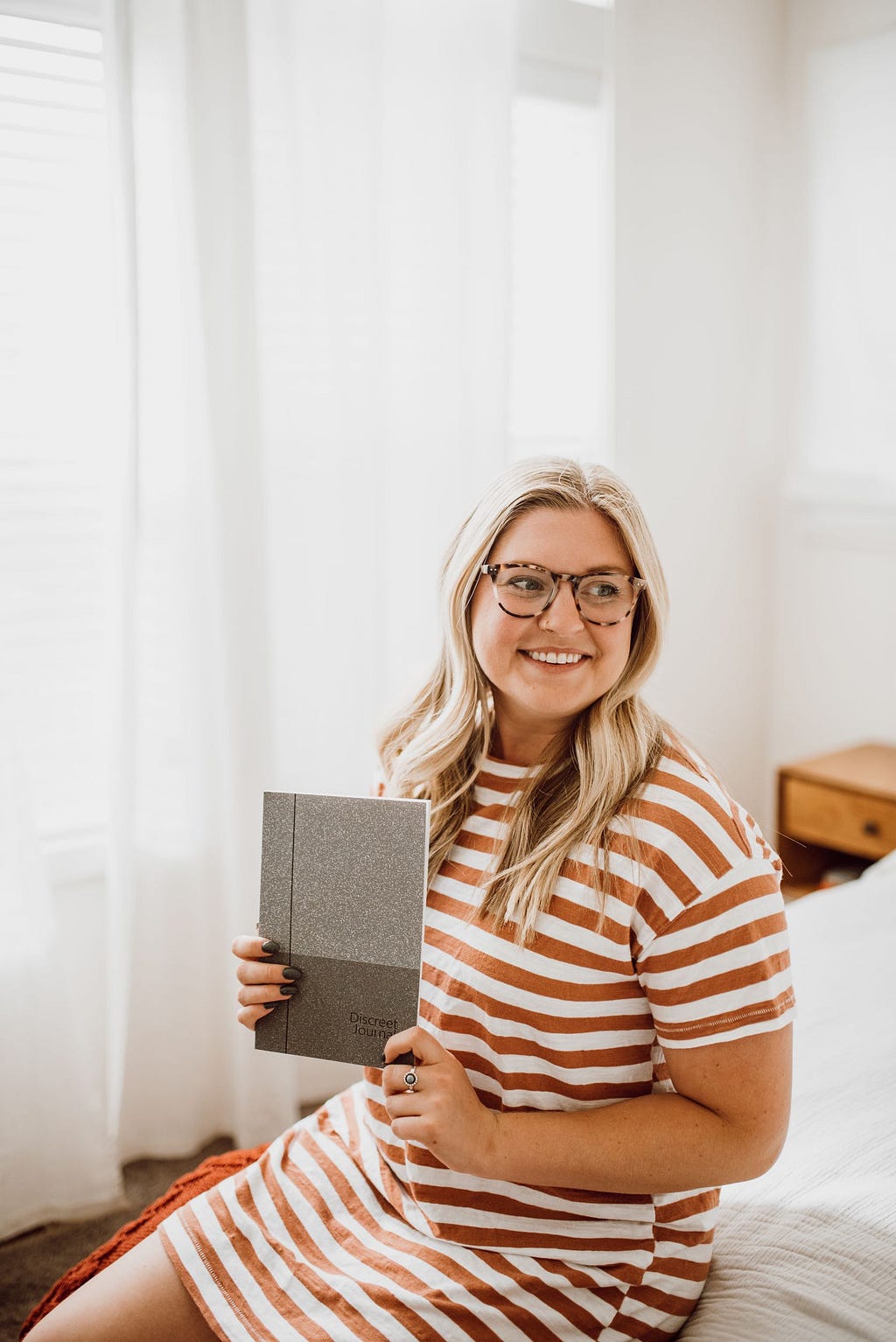
Empathy without boundaries is self-destruction. Set boundaries on your empathy and stick to them even if it disappoints others.
As a part of our series about How To Survive And Thrive As A Highly Sensitive Person, I had the pleasure of interviewing Sommer Grandchamp.
Sommer, founder of Discreet Journal, lives with severe OCD and Anxiety. She started showing signs of OCD at age 11, when she became unreasonable fearful of vomiting in public. She spent 12 years getting misdiagnosed before seeing a proper therapist at the age of 23. Sommer now creates guided workbooks that help people of all ages learn how to manage stress and articulate their emotions.
Thank you so much for doing this with us! Can you tell our readers a little bit about yourself and what you do professionally?
Thank YOU! On the surface, I am your average mid-twenties gal from Denver, CO working full time in the tech industry. But, behind my bubbly exterior, I have suffered with OCD and Anxiety since childhood and was really struggling until I got treatment in 2017. When I started treatment, I wanted to work on therapy exercises at my cubicle during my lunch break, but I couldn’t find any therapy workbooks that felt private enough to bring to my office. I created by own guided journal with the help of my therapist with no intention of publishing. In 2020, I was encouraged by friends, family, and that same therapist to self-publish my work due to the high stress caused by the pandemic. Within a year, we had sold over 1,000 journals across the US.
Thank you for your bravery and strength in being so open with us. I understand how hard this is. Can you help define for our readers what is meant by a Highly Sensitive Person? Does it simply mean that feelings are easily hurt or offended?
A highly sensitive person is someone who feels things deeply. For myself, I often find my emotions to be amplified in comparison to others. I feel a lot of my emotions physically. I find myself distracted by emotions often. My experience as a highly sensitive person does include being hurt more easily. But I work on skills to overcome this everyday. A benefit of being a highly sensitive person is that my “happy” emotions are also felt more deeply!
Does a Highly Sensitive Person have a higher degree of empathy towards others? Is a Highly Sensitive Person offended by hurtful remarks made about other people?
A highly sensitive person might take on the emotions of others, even if they do not know the person. This can flood the part of their brain where they process feelings and can cause deep pain over something that does not involve them.
Does a Highly Sensitive Person have greater difficulty with certain parts of popular culture, entertainment or news, that depict emotional or physical pain? Can you explain or give a story?
Yes, yes, yes. To give an example, I often find myself gloomy or melancholy throughout the day. I think to myself, what is causing my sadness again? It may take a few minutes to fish through my memory until I realize I am still feeling the pain of watching a sad news story from the previous night. Other people move on from things. I internalize them for days, weeks, or even months.
Can you please share a story about how your highly sensitive nature created problems at work or socially?
I have trouble saying no to people. A man I worked with, who was much older than me, mentioned he didn’t have many friends. He got in a bind and asked me to watch his dogs while he was out of town. We did not know each other well and I did not feel comfortable, yet I said yes. I said yes because I empathized with his desperateness of the situation. I put his needs over my own. When he invited me to come meet the dogs at his home, I did not feel safe and asked my boyfriend to join me. When we realized the sticky situation we were in, it caused tension in our relationship.
When did you suspect that your level of sensitivity was above the societal norm? How did you come to see yourself as “too sensitive”?
The very first memory I have of noticing I was more sensitive than others was at age 5. It was my first trip to the aquarium. There was an ugly looking fish and my dad and big sister were giggling at it. I burst into tears feeling so sad that this fish might have gotten its feelings hurt. I still can’t think too hard about the poor ugly fish.
I’m sure that being Highly Sensitive also gives you certain advantages. Can you tell us a few advantages that Highly Sensitive people have?
Being highly sensitive is a super power. Interpersonal relationships are often easier to maintain for highly sensitive people as they can be a safe space for their loved ones.
Can you share a story from your own life where your great sensitivity was actually an advantage?
My sensitivity has served me well in areas of life that you wouldn’t expect, such as my job. I work in a male dominated industry with high stress. There have been many times where my coworkers lose their temper or get overly emotional about the stress of a problem. Knowing my sensitive nature, they feel they can talk to me. I have made some great relationships at work this way, which has allowed me to progress my career much faster than I would’ve thought.
There seems to be no harm in being overly empathetic. What’s the line drawn between being empathetic and being Highly Sensitive?
The difference between being empathetic and being highly sensitive is boundaries. Highly sensitive people have a hard time being empathetic without letting it impede on their own mental health. That is the difference.
Social Media can often be casually callous. How does Social Media affect a Highly Sensitive Person? How can a Highly Sensitive Person utilize the benefits of social media without being pulled down by it?
A highly sensitive person often has “flooding” emotions and thoughts. Social media is designed to flood our brains with stimuli. So, social media can feel overwhelming for a highly sensitive person. The best way a sensitive person can use social media is to find other accounts or influencers who are also highly sensitive. This helps you feel less isolated.
How would you respond if something you hear or see bothers or effects you, but others comment that you are being petty or that it is minor?
This would cause a lot of distress for me. I would be sensitive to the stimuli that bothered me as well as sensitive to the opinions of those saying it’s petty. This could easily cause an overthinking spiral for me. To help myself assess these types of situations, I have a list of values that are important to me. I look to see if the issue goes against my core values, and if it does, I will speak up. If it is something not in my core values, I will try to let it go.
What strategies do you use to overcome the perception that others may have of you as overly sensitive without changing your caring and empathetic nature?
I talk to them about it. I let them know that I’m working on my emotion processing in therapy, but that I still struggle on bad days. I ask them for advice so that we can work together as a team.
What are the “myths” that you would like to dispel about being a Highly Sensitive Person? Can you explain what you mean?
Highly Sensitive people are not dramatic or faking it. They really do feel that strongly.
As you know, one of the challenges of being a Highly Sensitive Person is the harmful, and dismissive sentiment of “why can’t you just stop being so sensitive?” What do you think needs to be done to make it apparent that it just doesn’t work that way?
I think that more education and real-life examples of highly sensitive people should be publicized to normalize the trait.
Ok, here is the main question for our discussion. Can you share with us your “5 Things You Need To Know To Survive And Thrive As A Highly Sensitive Person? Please give a story or an example for each.
- Empathy without boundaries is self-destruction. Set boundaries on your empathy and stick to them even if it disappoints others.
- What other people think of me is none of my business. Other people might be thinking bad or good thoughts about you. Either way, it’s none of your business. You have no control over what they think. Let go and be you.
- It’s just a thought, not a crisis. When you have a distressing or sensitive thought, remember it’s just a thought and not a crisis.
- “The opposite of sensitive is not brave! The opposite of sensitive is insensitive” — Glennon Doyle. Being sensitive is your superpower. Don’t underestimate how magnetic you are.
- Feel your feelings. Feelings are for feeling, not avoiding. Sit with the emotion. Notice what it feels like in your body. Allow it to pass through.
You are a person of great influence. If you could inspire a movement that would bring the most amount of good for the greatest number of people, what would that be? You never know what your idea can trigger.
It’s hard to understand something we cannot see or touch. That means it’s hard to understand our feelings. I want to encourage people to start exploring their different emotions and getting familiar with themselves. This could save relationships, friendships, and help people get diagnosed with mental illness sooner if they know how to articulate their feelings.
How can our readers follow you online?
@DiscreetJournal
Discreetjournal.com
Thank you for these fantastic insights. We greatly appreciate the time you spent on this.
Sommer Grandchamp of Discreet Journal On How To Survive And Thrive As A Highly Sensitive Person was originally published in Authority Magazine on Medium, where people are continuing the conversation by highlighting and responding to this story.
